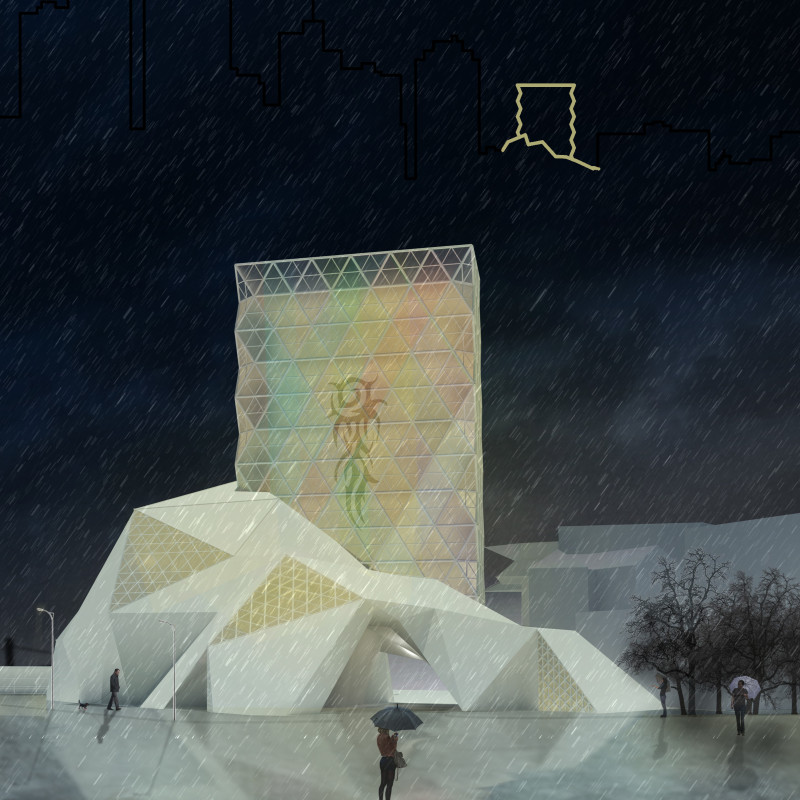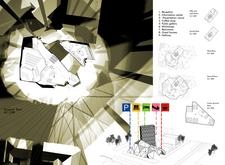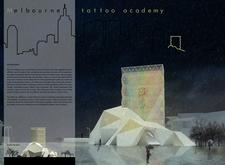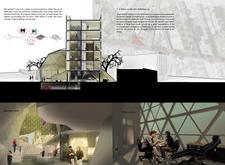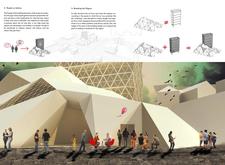5 key facts about this project
## Project Overview
Located in Melbourne, Australia, the Tattoo Academy is a dedicated facility aimed at advancing the practice and perception of tattooing as a legitimate art form. The intent is to provide a structured educational environment that facilitates a greater understanding of tattoo culture, while also serving as a cultural landmark designed to address and challenge existing societal stigmas.
## Conceptual Framework
### Identity Recontextualization
The design of the Academy actively works to shift the narrative surrounding tattoo art from one of marginalization to recognition as a significant cultural expression. By conceptualizing the building as a "tattoo on the skin of Melbourne," the architecture integrates local cultural identity, presenting tattooing within a broader socio-artistic context. This approach encourages dialogue about the evolving significance of tattoos in contemporary society.
### Dedicated Educational Spaces
Emphasizing tattoo art as an academic pursuit, the layout of the academy incorporates spaces for both instruction and public engagement. These include workshops for practical training, information centers for community education, and galleries for exhibitions. Such spatial configurations aim to foster interaction among artists, students, and visitors, promoting an inclusive environment that supports the study and appreciation of tattoo artistry.
## Design Elements
### Architectural and Spatial Composition
The Academy features a striking angular facade that reflects the intricate patterns found in tattoos. Designed with a triangulated, translucent surface, the facade captures and refracts light, creating a dynamic visual experience throughout the day. Internally, the building is organized across multiple levels to accommodate a variety of functions. The ground floor includes a reception and cafe, while dedicated workshop spaces for tattoo artistry are located on the second and third floors. A gallery occupies the fourth floor, showcasing tattoo art and providing a platform for artists to present their work. The upper levels serve as guest accommodations for visiting professionals, ensuring a supportive environment for both learning and cultural exchange.
### Material Selection
The material palette for the Academy was carefully considered for both aesthetic impact and functional performance. Prominent use of glass in the facade enhances natural light and promotes an open atmosphere. The concrete structure allows for the creation of complex geometric forms, supported by a steel framework that provides resilience and modernity. Geometric panels with triangular patterns add texture and detail, while wood is incorporated into interior spaces to enhance warmth and comfort for users.
### Sustainability Considerations
Sustainable practices are integrated throughout the design, utilizing materials that minimize environmental impact while incorporating energy-efficient lighting and climate control systems. These elements aim to establish the Academy as a forward-thinking institution that values ecological responsibility alongside artistic expression.
The Tattoo Academy serves as a cultural and educational hub, reshaping the narrative of tattooing through its strategic design and thoughtful consideration of materials and sustainability. The facility invites engagement and exploration of tattoo art in a contemporary context, promoting a nuanced understanding of this rich cultural practice.


